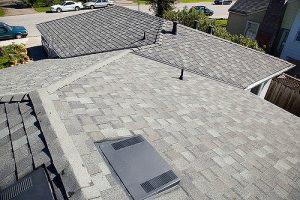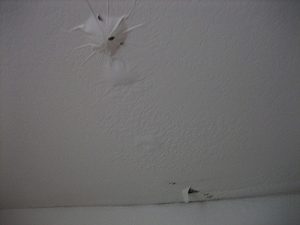It’s every homeowner’s worst nightmare. You’ve just paid thousands of dollars for a new roof, and the first time it rains you discover water dripping from your ceiling. While this may seem like the worst thing in the world to happen, most roof leaks on new roofs can be easily repaired and usually within a timely way as well. And while you may begin to panic, thinking that you’ll need to pay out even more money to get this problem fixed, the vast majority of roofers are reputable people who take their jobs seriously. This means that they are likely to want to correct this problem for you in a timely way, without issues or arguments. Make sure that you handle the problem from your end in the most appropriate manner possible to ensure that you get it fixed right and that you get it done quickly.
Stay Calm

A leak in your new roof is extremely upsetting, but getting worked up, yelling at the roofer, or tearing your hair out is not going to get it fixed any faster. So before you pick up the phone and begin to yell at your roof, you first need to stay calm and try to assess the situation. This means gathering as much information about the leak and its location as possible before you pick up the phone. While water can travel along the underside of your roof before finally coming through your ceiling, do your best to ascertain the location of the leak. This doesn’t mean that you need to climb up on your roof; a number of leaks can be spotted from the underside of your roof deck, or inside your attic. A quick scan of your roof from the ground may also yield some information as well.
The majority of roof leaks, especially on new roofs, take place around protrusions in the roof. In other words, skylights, stack lines, chimneys, and valleys are the most common places to see a leak if the tiles themselves are in good shape. If it’s still raining, and your contractor can’t get out there right away, see if you can put a tarp over the leaking area to minimize any damage. Otherwise, rest assured that the leak very likely can be fixed very soon. Do your best to find the leak and jot down anything you can see about it, this includes the time at which it started raining, how hard it was raining, and how long it had been raining for when the leak began to show up. Sometimes it’s a combination of rain and driving winds that can show a leak or a crack that isn’t readily apparent, so this kind of information can help you roofer determine the best way to fix your leak as quickly as possible.
After you have this information, and if possible after you’ve tarped the roof, it’s time to call your roofer. Remember to stay calm and deliver this information in as nice a way as possible to encourage your roofer to make good on his word and come out and fix this issue.
Don’t Make Threats
Obviously, a reputable contractor is going to make good on their work, and will come out in a fairly timely way – within a week in most cases – to fix the leak. Threatening the contractor, yelling, or making demands is not likely to get them out there sooner, and in the case of some less than reputable contractors, it may be enough to make them wash their hands of the job altogether.
Do your best to explain the situation in a calm fashion, giving the roofer as much information as you have. Remember, how hard it was raining before the water came in, where the leak is located if you were able to find it, and at what time the leak started are all important pieces of info that can make your roofer take this seriously and bump you up the list whenever possible. Stress that you need the roof to be fixed before the next rainfall, but don’t threaten to sue or send a lawyer after the roofer; this may be enough to make a small operation want to shut their doors, or at least bump you back behind other, friendly clients who may need work done soon as well.
Remember that the vast majority of roofers are professionals who will want to stand behind their work and fix this problem for you. Get a commitment from them that they will come out and fix the problem; thank them, and hang up. Be sure to give the roofer a realistic timeframe – such as a week – to come out and fix the problem, unless the week’s forecast is nothing but rain and you were unable to tarp the leak. In that case, it’s fine to insist that he come out a little sooner to make the repair. It’s fine to be firm, and it’s fine to let the roofer know if this is inconveniencing you. It’s not fine to yell, however, so do your best to stay in control during the call.
If the Roofer Has Disappeared
Occasionally, it does happen that you get a disreputable roofer, one that came in from out of town and vanished as soon as the job was done. If this is the case, don’t panic; you can still get your roof fixed and it probably won’t break the bank.
Remember that most leaking roofs are not leaking from the roof itself. It’s likely to be the flashing or seal around a protrusion in the roof. This is fairly easily fixed, and will likely not cost too much or take too long for a new roofer to repair.
It’s tempting to think that if one roofer left you out to dry, then a second one will, too, but you will have to do your due diligence and hire someone that can take care of you from here on out. Make sure that you interview at least three new roofers. Discard anyone that claims that he’ll have to reroof the entire thing again, and focus on anyone that can make the repair, and extend his own warranty to the rest of the roof as well. You may have to pay for this service, but it’s very helpful to have someone you can call the next time that something comes up. At the very least, find a roofer who can make the repair and guarantee his work in this area, even if he won’t warranty the rest of the roof. If you’re starting over with a new contractor, any assurances you can get for future repairs or work are going to go a long way.
Try Not to Worry
In the vast majority of times, a new roof is enough to stop any problems you may have been having. Mistakes can be made, however, and it does occasionally happen that a new roof will develop a leak as well. Try not to stress about it too much, and remember that your roofer is also a person who is entitled to their share of mistakes, provided they take steps to correct them afterward.


